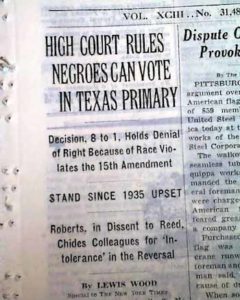
Newspaper clipping
On this date in 1944, Smith v. Allwright, 321 U.S. 649, was argued. This was a landmark ruling of the United States Supreme Court regarding racial desegregation and voter suppression.
Decided on April 3rd, 1944, it overturned the Texas state law that authorized parties to set their internal rules, including using white primaries. The court ruled that it was unconstitutional for the state to delegate its authority over elections to parties to allow discrimination to be practiced. This ruling affected all other states where the party used the white primary rule. The Texas Democratic Party had effectively excluded minority voter participation by this means, another device for legal disenfranchisement of African Americans across the South beginning at the end of Reconstruction.
Lonnie E. Smith, an African American dentist from the Fifth Ward area of Houston and a voter in Harris County, Texas, sued county election official S. S. Allwright for the right to vote in a primary election conducted by the Texas Democratic Party. He challenged the 1923 state law that authorized the party to establish its internal rules; the party required all voters in its primary to be white. The Texas Democratic Party had controlled politics in the South since the end of the Civil War, and the state legislatures of the former Confederacy effectively disenfranchised African Americans from 1890 to 1908 by new constitutions and laws raising barriers to voter registration and voting.
This crippled the Republican Party in most southern states and resulted in the only competitive elections being held as the Southern Democratic Party primary. Texas had used poll taxes and the white primary to exclude nearly all African Americans, Mexican Americans, and other non-whites from voting. (The poll tax also had the effect of excluding poor whites.).